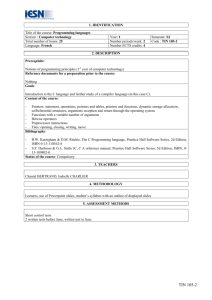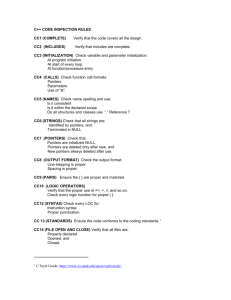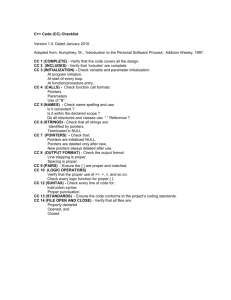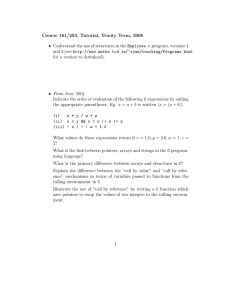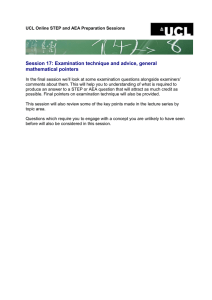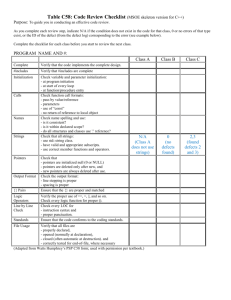Document 14539464
advertisement
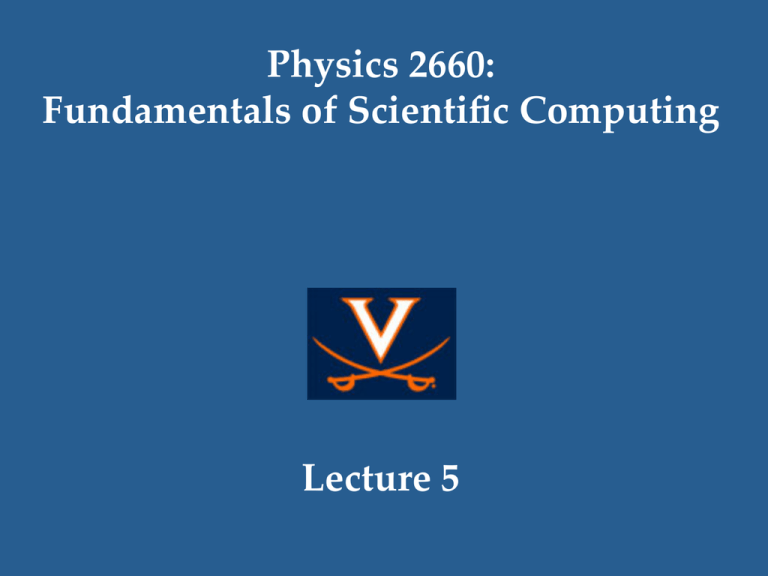
Physics 2660: Fundamentals of Scientific Computing Lecture 5 Announcements
• HW04 is due Friday 26 Feb at noon
• Do not forget to pledge your HWs!
• Grading of HW03 will be done by the weekend
• Lab solutions are coming!
• My office hours:
– Tuesdays 3:15-­‐‑5pm in Room 022-­‐‑C
• TA office hours, also in Room 022-­‐‑C
– Mondays 5:00-­‐‑8pm
– Tuesdays 5:00-­‐‑8pm
2
Announcements
• Midterm Exam:
– Scheduled for next Tuesday 1 March
– Requests from some students to move the exam to the following week…which is Spring Break
3
Announcements
• Midterm Exam:
– Scheduled for next Tuesday 1 March
– Requests from some students to move the exam to the following week…which is Spring Break
– We will reschedule the exam for the evening of Tuesday 15 March, the week you return from Spring Break
• 7pm in room 204 (this room)
4
Unsolicited Tips
• Don’t neglect to use command history in linux. Try this:
–
–
–
–
log in to galileo
press up arrow
the last command you executed on galileo will appear!
more instances of up arrow will give you more of your command history
• Launch emacs in a new window this way from your galileo session:
– emacs myfile.C &
– The ‘&’ in the Linux OS allows you to have access to your command line
session on galileo while editing your document – nice for debugging!
• Linux tip: use ls –lrt to show when files were last modified and their
sizes, ownership
• Use of multiple simultaneous terminal connections to galileo is
encouraged…allows you to compile and run in a different session from
your code editing
5
Review from Last Time and Today’s Outline
• Last time:
– More on loops • conditioned controlled loops: while(), do – Random numbers
• Today:
–
–
–
–
–
–
–
–
–
–
–
More on random numbers The scope of variables
More on functions: limitations and extensions
Pointers in C
Static variables
Recursive functions
Arrays in C
Passing arguments to main(..)
Creating re-­‐‑usable code
Review of pointers and pointers to functions
Intro to statistics
6
Back to Random Number Generation
7
Generating a Random Number
• One can generate a random number in some range in which all the possibilities have the same probability:
– The probability distribution function is sometimes called the “prior” in the vocabulary of statistics
• Each value same probability = “flat prior”
• Example: – Tossing a coin: Assign heads = 0, tails = 1. Each has probability 0.5.
– Tossing a single fair dice: Each integer value [1,6] has same probability = ~0.166667
• A random number need not have a flat prior distribution!
– Can have some other distribution…like a Gaussian, or some user-­‐‑defined thing.
– We will explore this in lab this week.
8
An Example: Integration Using Random Numbers
9
An Example: Integration Using Random Numbers
10
Monte Carlo Techniques: Integration
11
Monte Carlo Integration
12
Multiple Measurements
13
Monte Carlo Techniques: Integration
14
The Scope of Variables
15
Scope
• When one defines a variable in C, it is accessible only in a well-­‐‑defined extent within the program
• Scope refers to where variables can be accessed
– Variables defined inside a function are available only in that function. These variables are of local scope
– Variables can be defined outside all functions and accessed anywhere. These variables are of global scope.
16
Global vs. Local Scope
17
Global vs. Local Scope
Not allowed:
int main(){
int a;
float a; // not allowed!
return(0);
}
18
Guidelines for Scope and Variable Definitions
• In general, it is best to keep your variables limited to the smallest scope possible
• Having a globally-­‐‑definied and accessible variable means it can be manipulated/changed ANYWHERE in your code – and this could lead to
– confusion
– bad results
– heartache
19
Internal Comments and Documenting Code
20
Internally Documenting / Comments
21
Static Variables and Functions
22
Lost Information in Functions
• As described before, typically variables created in functions are only temporary – their contents are lost when a function completes
23
Static Variables in Functions
• We can get around this by declaring the variable in the function as static 24
Static Variables: Uses
• Static variables can be used to…
– flag a function as having already been called
– keep track of how many times a function has been called
– keep track of values a variable amained in previous calls
– keep track of previous paramters sent to a function
25
Functions: Limitations and Further Uses
26
Functions As We Know Them So Far
• The kinds of functions we have used so far
– have some type
– are given some arguments – which do not change in a global sense
– return some value – which we then use
27
Functions As We Know Them So Far
28
Functions: More Functionality
• So far we have used functions in this manner:
– Supply some arguments to a function, some values we need for a calculation
– The function uses those arguments/values to perform some task
– The result is:
• stored in some variable of global scope OR
• returned as the result of the function OR
• the function returns success / failure and the code proceeds accordingly
• This behavior is somewhat limited!
• single output is a limitation
• cannot manipulate the arguments…this is often a less-­‐‑than-­‐‑desirable feature
• We need a more general function interface
29
Functions: Two Types
• Functions in C can be classified into two types:
– pass-­‐‑by-­‐‑value: (what we have done so far)
• the initial values of the arguments are not allowed to change globally
• they can change interior to the function, but those changes are never carried out on the global variable
• Copies of the input vars are made but not used beyond the function
– pass-­‐‑by-­‐‑reference:
• arguments can be values or memory locations
• output can be “returned” through the parameter list
• allows multiple results to be accessible to rest of program 30
Functions: Two Types
• Functions in C can be classified into two types:
– pass-­‐‑by-­‐‑value: (what we have done so far)
• the initial values of the arguments are not allowed to change globally
• they can change interior to the function, but those changes are never carried out on the global variable
• Copies of the input vars are made but not used beyond the function
Pass-­‐‑by-­‐‑reference functions requires a discussion of pointers to variables in – pass-­‐‑by-­‐‑reference:
memory….
• arguments can be values or memory locations
• output can be “returned” through the parameter list
• allows multiple results to be accessible to rest of program 31
Pointers
32
Pointers: What are they?
• Pointers are like variables that provide direct access to the memory location for a specific variable
• One can then manipulate the contents of the memory location – and hence manipulate the contents of the variable from any location in the code
– allows global access and manipulation
• Pointers give them user more power and more freedom!
• However, paraphrased from many (Voltaire, Churchill, FDR, Uncle Ben in Spiderman)
“With great power and freedom comes great responsibility.”
33
Recall: Variable Storage
34
Memory Addresses: The ‘&’ Operator
35
Memory Addresses: Storage in Functions
36
Memory Addresses: Storage in Functions
37
Pointers
38
Storing Pointers in Memory
39
Pointers: The Indirection Operator ‘*’
40
Pointers: Changing Data in a Memory Location
41
An Example: scanf
42
Passing Pointers As an Argument To A Function
43
Advantages: Passing Pointers As Args To Functions
• Through the use of pointers passed to functions, we can manipulate an arbitrary number of variables, rather than just return one result
44
Pointers: Be Careful!
45
Pointers: Be Careful!
46
Recursive Functions
47
Recursion: An Example
• So we really don’t need to calculate the product of N numbers, just the product of 2 numbers (N-­‐‑1) times, each time one of the numbers being new, one being retained from the previous iteration – recursion
48
Recursive Functions
49
We’ll pick up from here next time. See you then.
50
